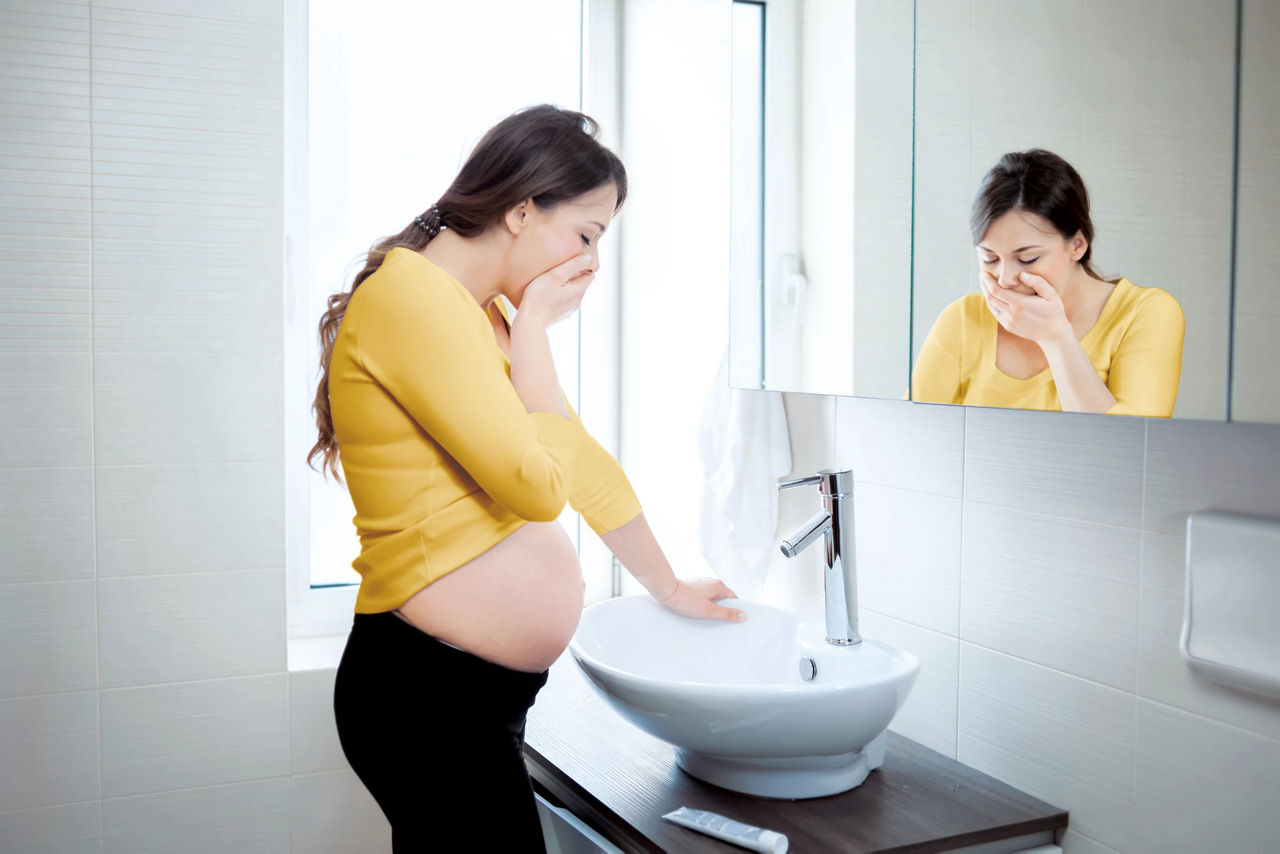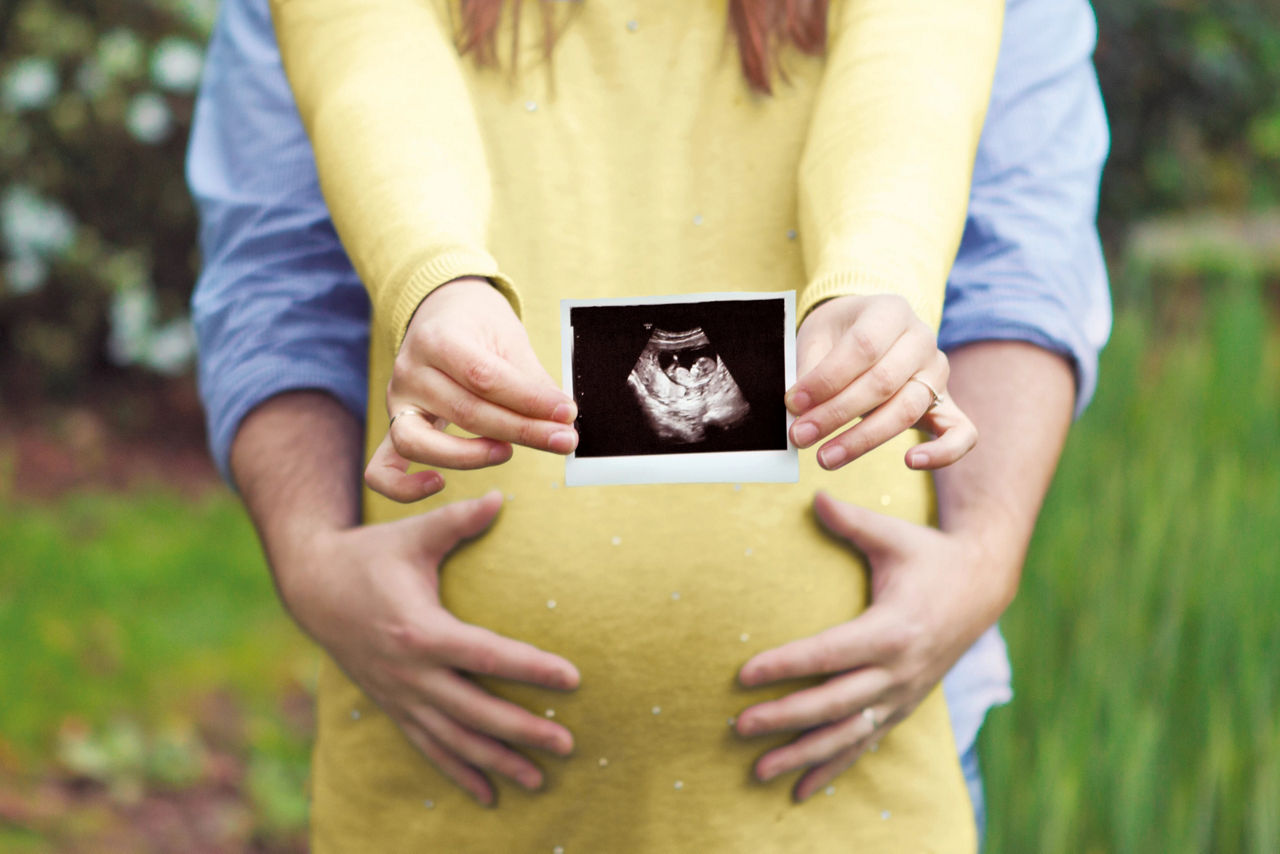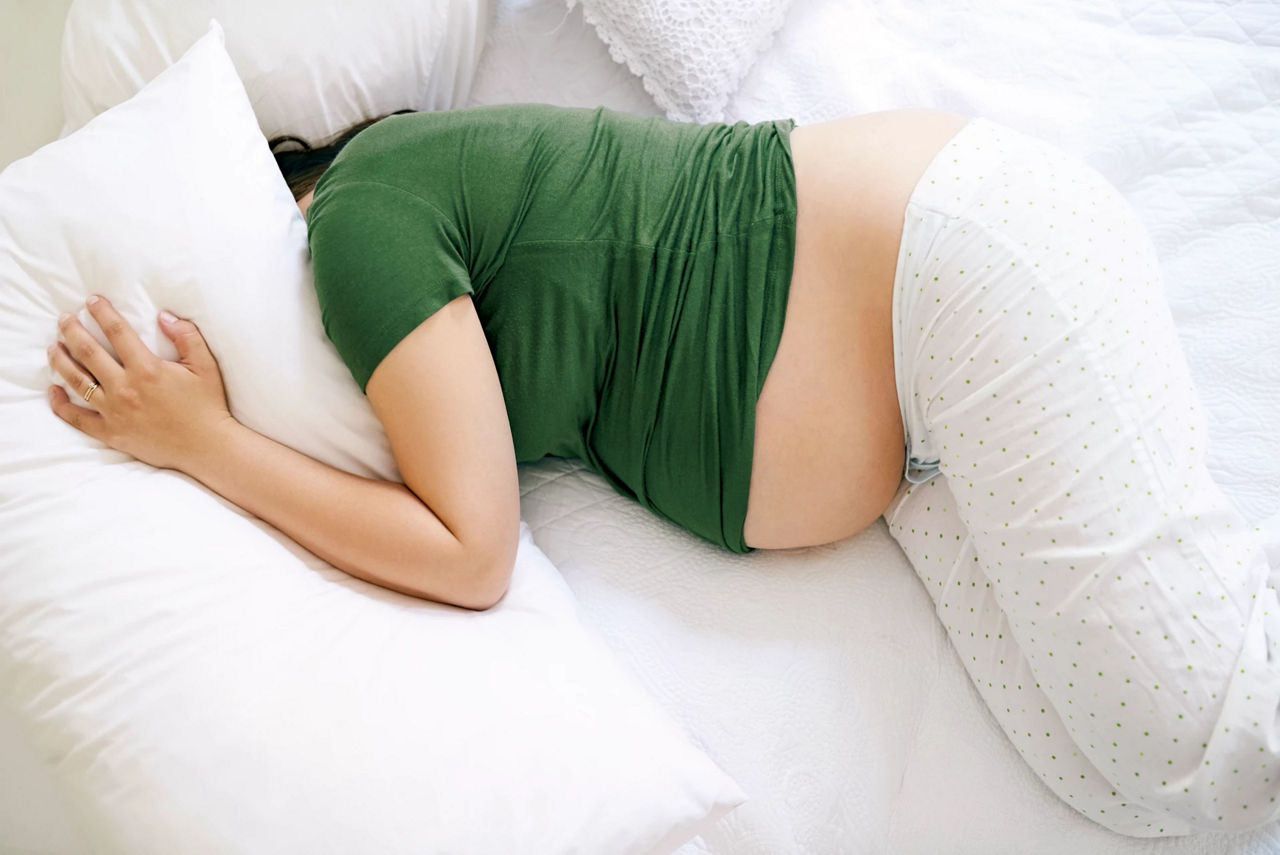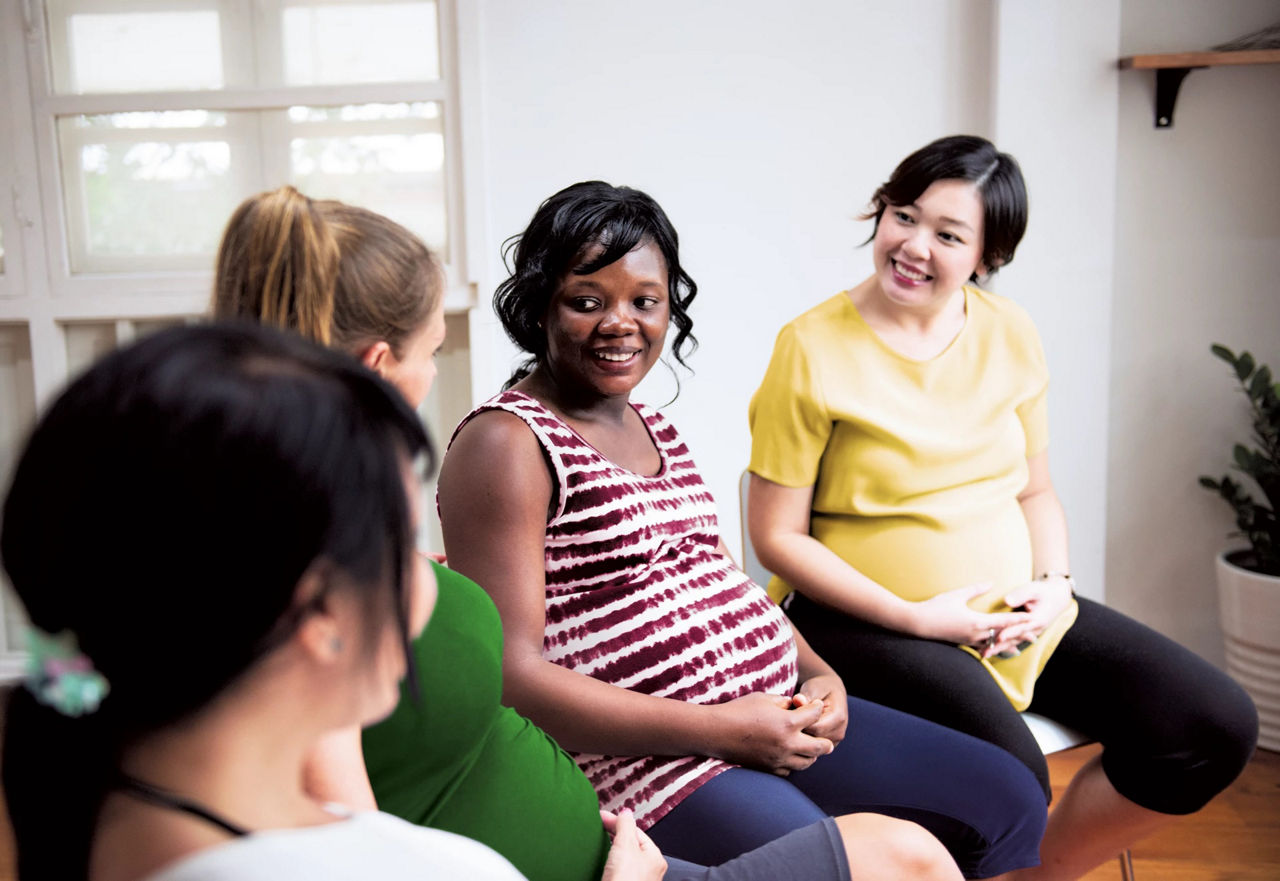Free weaning plan - Register here
Your body goes through many changes during pregnancy, both physical and emotional. As part of the journey to parenthood, it’s not unusual for some of those well-known pregnancy symptoms to kick in.
Nausea and vomiting during pregnancy, also known as morning sickness, are just one of them. Morning sickness is a clear contender to win the award for the most famous pregnancy symptom and is, for many women, one of the earliest indications that a baby is on the way.
Here we’ll take a look at what causes morning sickness, how you can manage your symptoms, and how to spot the signs of hyperemesis gravidarum, a severe form of morning sickness.
Morning sickness
Morning sickness is one of the most common early pregnancy symptoms, affecting around 80% of expectant mums1. It usually starts between weeks 4 and 7 of pregnancy, and whilst it can be unpleasant, it won’t cause any harm to you or your growing baby2.
Don’t be fooled by the name… morning sickness can strike at any time of the day or night, although your symptoms may be worse as soon as you wake up2. You’re more likely to find yourself dealing with morning sickness if3:
- You’ve had it before during a previous pregnancy.
- You’re prone to migraines and/or motion sickness.
- You’re having a multiple birth.
- If you have a BMI above 30
- If this is your first pregnancy
Try keeping bland foods like dry crackers close to your bed. This could help ease nausea first thing in the morning and give you a little energy boost.
Hyperemesis gravidarum
Some women develop a condition known as hyperemesis gravidarum, which can affect their quality of life and leave them unable to keep any food or fluids down. Symptoms include4:
- Being sick many times a day or prolonged periods of vomiting.
- Being unable to keep food and fluids down after eating and drinking.
- Weight loss.
- Dehydration - look out for you not weeing very often, feeling dizzy and lightheaded, and having wee that’s dark in colour and with a more intense smell.
Sometimes, hyperemesis gravidarum requires some treatment in the hospital, to ensure that you and your baby stay happy and healthy. If you’re experiencing any of the above or struggling to manage the symptoms of morning sickness, be sure to chat with your doctor or midwife or seek advice from A&E.
What causes morning sickness?
No one really knows for sure what causes morning sickness, although it’s likely that the hormonal changes that occur in your body during early pregnancy play a part3. Ready for a bit of science?5
- hCG (human chorionic gonadotrophin). Your body starts to produce this hormone once the egg has been fertilised, and it’s the hormone responsible for that positive result on your pregnancy test. As levels increase, it’s possible that this increase causes nausea and vomiting.
- Oestrogen. As levels of this female sex hormone increase, there’s a possibility that this will result in morning sickness. During early pregnancy (the first 12 weeks), your oestrogen levels are at their highest, which tends to be when the symptoms of morning sickness are worse.
- Progesterone. This hormone helps to prepare your womb for pregnancy. It can be responsible for restricting movement inside your small intestine and stomach, which in turn may cause vomiting and feelings of nausea.
Some evidence also suggests that a lack of vitamin B6 can cause morning sickness5. If your doctor thinks you need treatment to help you manage your morning sickness, you might be prescribed vitamin B6 supplements.
How long does morning sickness last for?
When does morning sickness stop? If you’re dealing with morning sickness during your pregnancy, this is probably a question you're asking.
There’s no way to know exactly how long your morning sickness will last. It may be that you experience waves of nausea at various points during your pregnancy, with an unpleasant smell or a particular food that sets you off. There’s no doubt about it; the symptoms of pregnancy can be very unpredictable!
The good news is, however, that as a general rule of thumb, symptoms start to ease off between weeks 16 and 20 of your pregnancy3.
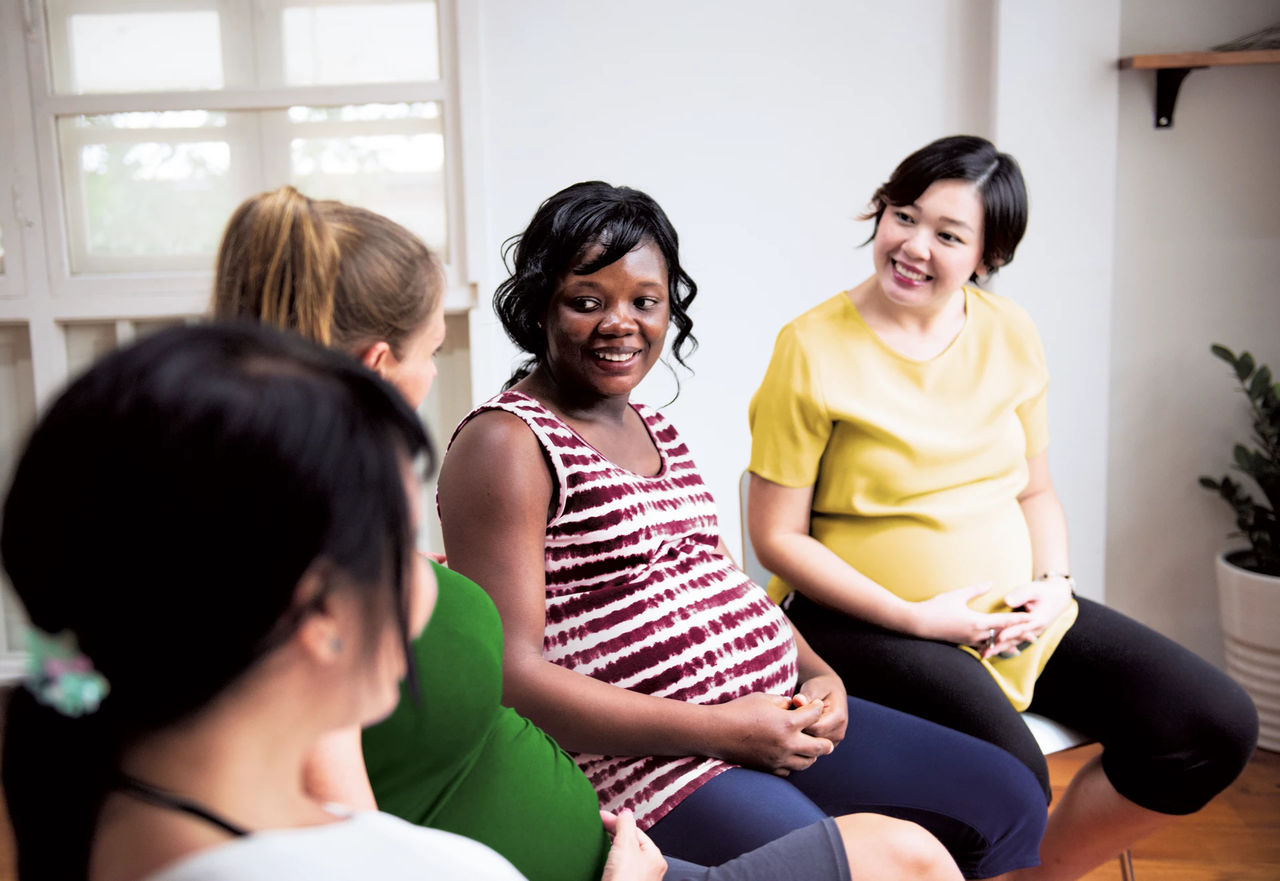
Are there any cures for morning sickness?
Unfortunately, there are no definite morning sickness cures. Every woman and every pregnancy is different, and when it comes to morning sickness remedies, it’s all about finding what works for you.
Below are some ideas for home morning sickness remedies, which you can try simply by making small adjustments to your diet and lifestyle.
Self-administered morning sickness remedies
When it comes to your diet, morning sickness remedies to try includeincluding:
- Bland foods. Eating plain, bland foods such as crackers or dry toast first thing in the morning may help to keep nausea and vomiting at bay.
- Eat little and often. Smaller, lighter meals are easier on your stomach than larger, heavier ones. In addition, eating regularly will keep your blood sugar levels up and help to prevent your stomach from being too empty6.
- Keep snacks handy. If you don’t have much appetite, keep some bland foods and snacks handy throughout the day to keep your energy levels up.
- Eating foods high in carbohydrates. Carbohydrates can help to settle your stomach and any queasiness you might be feeling. Try starchy, bland foods like bread, pasta, potatoes and cereal6.
- Eat cold food rather than hot. This might particularly help if you’ve become more sensitive to smell during your pregnancy, and if this is the case, you may want to give any spicy or fatty food a miss. This is the perfect excuse to put your feet up and let somebody else do the cooking.
- Ginger. Some evidence suggests that ginger can be an effective morning sickness remedy. Try ginger ale or ginger biscuits to see if these work for you3.
- Drink plenty of fluids. Take frequent sips of water to ensure that you’re staying hydrated. You should aim to drink at least 2 litres of water a day. You could also try ginger, which may help with feelings of nausea7.
- Sucking ice cubes2.
Give the below changes to your lifestyle a try when trying out morning sickness remedies:
- Acupressure. Some people find acupressure one of the most effective morning sickness remedies. Try putting pressure on your wrist, either with your fingers or using acupressure wristbands or bracelets to see if your symptoms ease.
- Stay comfy. Wearing tight and uncomfortable clothing can feel very restrictive, especially as your baby bump gets bigger. Instead opt for loose comfortable clothing without tight waistbands.
- Get plenty of rest. It’s very important to listen to your body during early pregnancy and beyond, and whilst it might be easier said than done, try to rest as and when you need to. You could also try resting for 20-30 minutes after you wake up, and after you’ve eaten a plain, dry snack.
Anti-sickness medicines to cure nausea
If you’ve tried the above morning sickness remedies and you’re still struggling with symptoms, it’s a good idea to chat through your options with your doctor.
If you have severe morning sickness, your doctor may prescribe anti-sickness medicine that’s safe to use in pregnancy. This is known as an antiemetic3.
Although a lack of vitamin B6 can potentially cause morning sickness, always seek medical advice before taking vitamin B6 supplements, to ensure that this is an appropriate remedy for you and your baby8.
When to seek medical advice for morning sickness?
If morning sickness is starting to affect your quality of life, or the symptoms are beginning to make you feel upset and low in mood, it’s always a good idea to speak to your doctor or midwife. Remember that they’re here to help you, and even if a specific treatment isn’t needed, getting the advice and support you need can help to put your mind at ease.
There are some circumstances, however, when you should always seek medical advice. These are when any vomiting happens alongside3:
- A high temperature.
- Being unable to keep fluid or food down for a period of 24 hours.
- Weight loss.
- Blood in your vomit.
- Tummy/abdominal pain.
- Dark-coloured wee or not weeing as often.
- Feeling tired, weak, dizzy or faint.
Last reviewed: October 2024
Reviewed by Nutricia’s Medical and Scientific Affairs Team
- NHS Chelsea and Westminster Hospital. Nausea and vomiting in pregnancy—hyperemesis gravidarum [online]. Available at https://www.chelwest.nhs.uk/your-visit/patient-leaflets/womens-services/nausea-and-vomiting-in-pregnancy-hyperemesis-gravidarum. [Accessed May 2024]
- NHS Start for Life. Morning sickness [online]. Available at https://www.nhs.uk/start-for-life/pregnancy/morning-sickness/. [Accessed May 2024]
- NHS. Vomiting and morning sickness [online 2024]. Available at https://www.nhs.uk/pregnancy/related-conditions/common-symptoms/vomiting-and-morning-sickness/. [Accessed May 2024]
- NHS. Severe vomiting in pregnancy [online 2023]. Available at https://www.nhs.uk/pregnancy/related-conditions/complications/severe-vomiting// [Accessed May 2024]
- NHS Manchester University. Hyperemesis gravidarum [online 2022]. Available at https://mft.nhs.uk/app/uploads/sites/4/2018/04/TIAG-18-22-Patient-Leaflet-Hyperemesis.pdf. [Accessed May 2024]
- NHS Liverpool Women's NHS Foundation Trust. Sickness & Vomiting in Pregnancy Information Leaflet [online 2015]. Available at https://www.liverpoolwomens.nhs.uk/media/4511/die_2018-192-v2.pdf. [Accessed May 2024]
- NHS University Hospitals Sussex. Nausea and vomiting in pregnancy [online 2023]. Available at https://www.uhsussex.nhs.uk/resources/nausea-and-vomiting-in-pregnancy-2/. [Accessed October 2024]
- Sahakian V, Rouse D, Sipes S, Rose N, Niebyl J. Vitamin B6 is effective therapy for nausea and vomiting of pregnancy: a randomized, double-blind placebo-controlled study. Obstet Gynecol. 1991 Jul;78(1):33-6. PMID: 2047064.

Join our baby club
Ready to stop worrying about what other people think and do what feels right to you? We’ll give you the support you need to follow your instincts and enjoy parenthood to the max:
Helpful emails
Non-judgemental support
Free weaning plan
Tips from real parents
More from pregnancy
Pregnancy topics
Need free advice with a smile? Get in touch with our dedicated Care team.
Ask us a question (8am - 8pm Monday to Friday, 10am - 4pm Weekends)
Messenger
Contact us on Facebook (10am - 10pm, 7 days a week)
Call us
Call us on 0800 977 8880 (8am - 8pm Monday to Friday)
FAQs
Get answers to your most frequently asked questions
